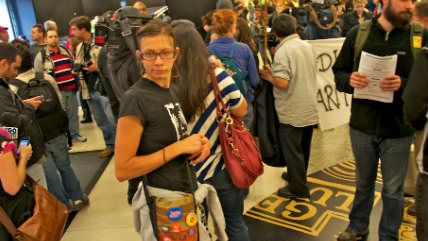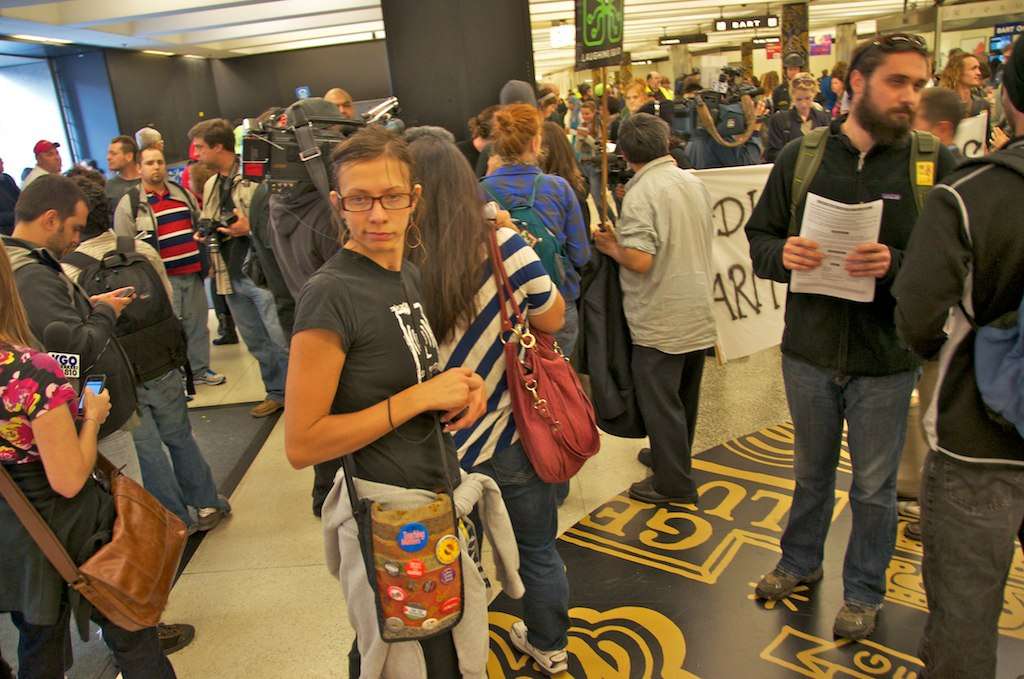Baby Boomers Share Blame for Today's Censorship-Happy Students
The students of today aren't super-coddled, they're just following the logic of censorship that earlier liberals either helped to set in motion or shrugged their shoulders at.


It's fun and important to mock the jumped-up Joe Stalins who have seized power in student associations across the West and who are banning songs, hats, newspapers, and people that piss them off. But it isn't enough. Too often we treat this scourge of student censorship as a sudden, almost malarial hysteria infecting campuses—the fault of a uniquely intolerant generation corrupting a hitherto healthy academy with their demands to be Safe-Spaced from hairy ideas. But this is wrong. These ban-happy brats are actually the bastard offspring of… well, of some of the people now criticizing them. They are Complacency's Children, the angry logical conclusion to liberals' failure over the past 30 years to kick back against a creeping culture of intolerance.
The good news: Over the past year, everyone from Barack Obama to sensible feminists have taken to calling out the censoriousness of students. And they definitely deserve called out. Consider recent examples of student-union tyranny in Britain:
- The students' union at Warwick University banned Maryam Namazie, an Iranian secularist and critic of Islamism, on the basis that her comments would "intimidate" Muslim students. (Following a media storm, it backtracked.)
- Last week, Manchester University's students' union, lacking even a smidgen of self-awareness, banned a debate on free speech on the basis that it might harm students because one of the speakers was Julie Bindel, a feminist who has committed various politically correct speech crimes.
- The students' union at the University of East Anglia prevented students from wearing sombreros on "cultural appropriation" grounds.
Other students' unions in Britain have banned the Robin Thicke song "Blurred Lines," men's magazines like Zoo and Nuts (they contain images of scantily-clad women, which is a big no-no for the weirdly prudish radicals of the 21st century), and the making of "sexual noises." Then there are all the countless folks who have been "No Platformed" by Britain's student-union terrors, including members of far-right political parties, Zionists, and alleged "Islamophobes."
Last year I was prevented from speaking about abortion at Oxford (I was due to make the pro-choice case) on the basis that I don't have a uterus. Such is the knee-jerk prejudice of student leaders that they think nothing of banning speakers not only because of what they say, but even because of their biological make-up.
All these cases expose how utterly contemptuous of the student body today's student leaders are. The idea that Muslim students can be easily "intimidated" by words, and that female students must be protected from saucy pop songs, is shot through with a retro neo-colonialism and Victorian-style fear for dainty women's mental safety.
Student leaders commit what Frederick Douglass called censorship's double-wrong: "It violates the rights of the hearer as well as those of the speaker." They silence those who provoke, and infantilize those whose very purpose in life is to be provoked, to have their minds rattled during their time at university.
Such paternalism can be seen in the U.S. too. From the demand for warnings on classic works of literature that mention rape to the idea that controversial speakers might threaten students' mental safety, policers of student life suck the soul out of the academy when they treat words as violence.
Yet as we criticize the illiberal turn on campus, we must also ask where these banners and buzz-killers came from. To follow the growing media and political backlash against P.C., you'd be forgiven for thinking these students emerged from nowhere, zombie-like, overrunning the academy with their deathly miserabilism. The largely forty- and fifty-something observers wringing their hands over the spread of the P.C. blob present this as a generational conflict, pitching switched-on older people against muddled youth who've lost the love of liberty.
This is too simplistic. It brings to mind the grey-haired guardians of the academy in the 1960s, who wondered how spoiled, long-haired students were managing to overthrow curricula and introduce relativism into university life without ever once stopping to wonder if perhaps their own complacency towards enlightenment values might have acted as a green light to these "pinkos." Now liberals rather than traditionalists are throwing their hands up in horror at a new generation while failing to ask if their own complacency might have midwifed it.
This is clearest in the U.K. Here, the student-union policy of No Platform has existed since 1974. In the 1970s and 80s it was used largely against the far-right. Then it spread to Zionists. In the 1990s it was used against Islamist groups like Hizb ut-Tahrir, on the basis that they were homophobic and menacing. Then in 2001 it spread to Eminem, because… well, he's homophobic too, right?
How did British liberals respond to these bans? Not well. They either turned a blind eye to them, or supported them. Indeed, in a February letter to The Guardian decrying the new No Platforming of radical feminists, various academics said No Platforming was supposed to be "a tactic used against self-proclaimed fascists and Holocaust deniers." So even as they bemoan the No Platforming of radfems, they green-light the No Platforming of right-wingers.
This sums up the problem with the middle-aged backlash against P.C: It's too late, and it still isn't consistently challenging censorship. Its main concern is that "people like us" are now falling victim to P.C. student intolerance.
In the U.S., too, many liberals seem to have become concerned with P.C. only when their friends fell victim to it. When Jonathan Chait, in his New York essay in January, said P.C. "has returned," you had to wonder where he'd been for the past 20 years. From the Brown University students who stormed their newspaper's offices after it published a piece criticizing reparations for slavery, to the Dartmouth students who burnt their newspaper after they thought it had made light of date rape, throughout the 2000s this attitude had been running riot on campus, following on from its explosion in the 80s and 90s. Perhaps liberals didn't notice because its main targets back then were right-wingers, Christian evangelists, and Israel supporters, rather than liberals.
Throughout the 1990s and 2000s, too many liberals failed to stand up to the censorship of scoundrels. And as H.L. Mencken said: "The trouble with fighting for human freedom is that one spends most of one's time defending scoundrels. For it is against scoundrels that oppressive laws are first aimed, and oppression must be stopped at the beginning if it is to be stopped at all."
Liberals' complacency in the face of a 30-year tide of intolerance, fuelled by identity politics, the therapeutic culture, and the politics of victimhood, allowed P.C. to take root among a new generation. I mean, if an Islamist can be banned for being homophobic, why not Eminem? And if a neo-fascist can be banned because his ideas "harm" ethnic minorities, why not a radfem whose ideas "harm" trans people? The students of today aren't super-weird, they're just following the logic of censorship that earlier liberals either helped to set in motion or shrugged their shoulders at.


Show Comments (40)